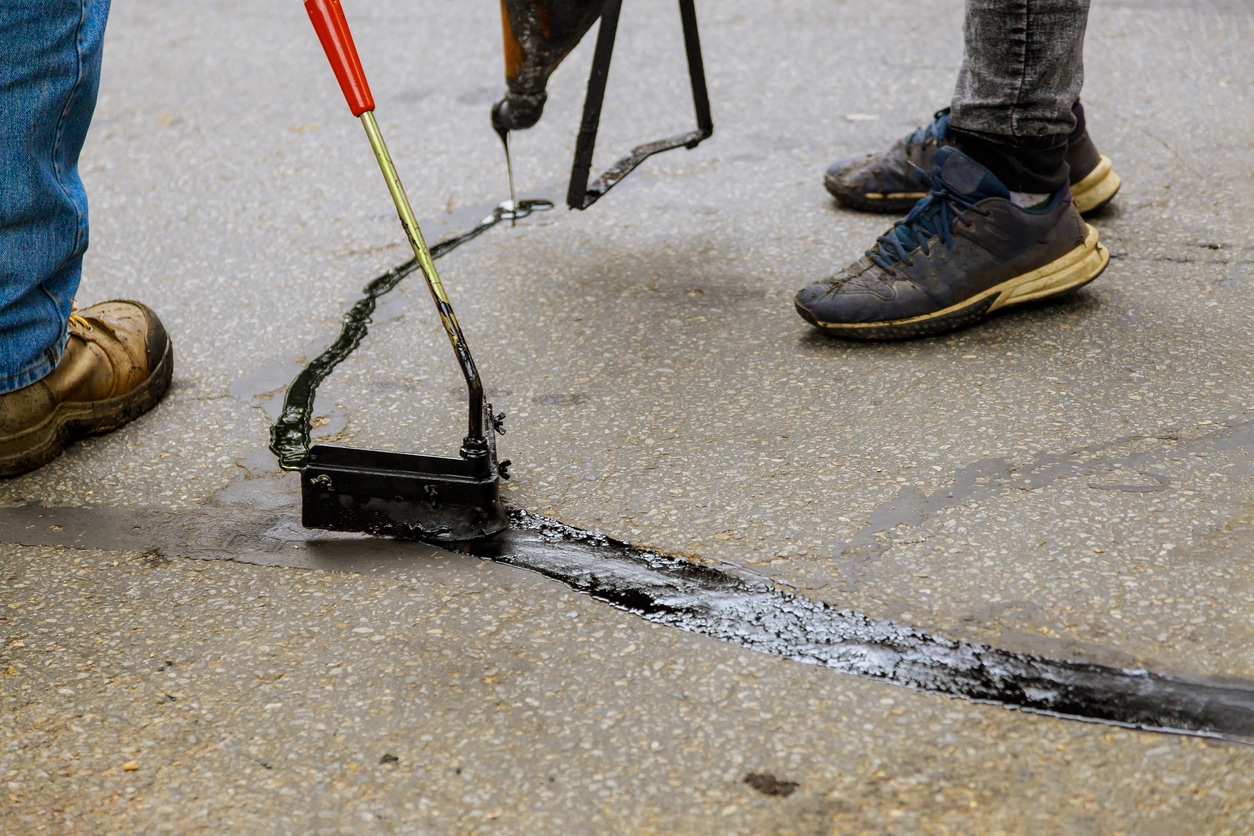Swift Solutions for Asphalt Spot Repair: Optimal Securing Techniques
Swift Solutions for Asphalt Spot Repair: Optimal Securing Techniques
Blog Article
Cold Mix Asphalt Vs. Hot Mix Asphalt: Which Is Right for You?

Make-up Differences
Cold mix and hot mix asphalts differ dramatically in their structure, with distinct characteristics that impact their performance and applications. Cold mix asphalt is generated by emulsifying the asphalt binder with water and an emulsifying agent prior to blending it with accumulation. This technique permits the asphalt to be convenient at reduced temperatures, making it ideal for short-lived repair work and for use in colder climate condition. Hot mix asphalt, on the other hand, is manufactured at heats, usually in between 300-350 ° F, which aids to attain far better compaction and an extra long lasting final item. The warm mix asphalt manufacturing process includes heating the accumulation and asphalt binder independently prior to combining them at the asphalt plant.
Furthermore, chilly mix asphalt tends to be much less dense and more versatile than warm mix asphalt. This flexibility makes it much better suited for areas with higher degrees of movement, such as driveways or roads with heavy web traffic. In contrast, warm mix asphalt is understood for its high durability and resistance to rutting and fracturing, making it a preferred choice for highways and high-traffic roads where longevity is crucial.
Installment Process Variations
The procedure of setting up cool mix and hot mix asphalt displays significant variations in their needs and procedures. Cold mix asphalt, being a much more versatile product, can be applied directly from the bag or container onto the hole or harmed area. It requires very little preparation work, such as cleansing the area and condensing the chilly combine with hand devices. This makes it a practical choice for short-lived and fast fixes. On the other hand, hot mix asphalt requires a more intricate installment procedure. It includes warming the mix to heats prior to laying it down on a correctly ready base. The prep work consists of compacting the base, applying a tack coat, and using hefty equipment like pavers and compactors for a sturdy and smooth surface. Due to the heating needs, warm mix asphalt installments are typically accomplished by experts with customized devices, guaranteeing an extra structurally audio and irreversible outcome.
Resilience and Longevity Aspects
When taking into consideration asphalt options, longevity and durability are vital variables to review for enduring sidewalk efficiency. Hot mix asphalt (HMA) is known for its outstanding sturdiness and durability.
In terms of longevity, HMA normally outmatches CMA as a result of its exceptional strength and resistance buildings. HMA sidewalks have a longer service life, calling for less constant fixings and maintenance, which can convert to set you back financial savings in the long run. Additionally, HMA pavements are more quickly personalized to fulfill details task demands, even more improving their sturdiness.
Price Factors To Consider
Taking into consideration the economic implications is a critical element when reviewing the selection in between hot mix asphalt (HMA) and chilly mix asphalt (CMA) for sidewalk jobs. While the initial expense of warm mix asphalt is normally greater than that of cool mix my response asphalt, HMA commonly offers an extra cost-effective service in the long run due to its remarkable longevity and durability.
In enhancement to material prices, it's vital to consider the expenses associated with installment and maintenance when contrasting HMA and CMA. Inevitably, the choice in between HMA and CMA ought to take right into account not just the first price yet likewise the long-lasting monetary effects to establish the most economical choice for the specific pavement job.
Environmental Impact Comparison
Comparison of the ecological impacts between warm mix asphalt (HMA) and cold mix asphalt (CMA) exposes distinctive differences in sustainability techniques. HMA manufacturing requires high temperature levels, leading to enhanced energy usage and go to website greenhouse gas exhausts.
In addition, the use of CMA commonly includes recycling existing asphalt pavement, advertising resource conservation and lowering the amount of waste sent to landfills. By choosing for CMA over HMA, road construction projects can contribute positively to environmental conservation initiatives.
Final Thought
To conclude, the option in between cold mix asphalt (CMA) and hot mix asphalt (HMA) relies on different elements such as structure, installation process, longevity, long life, expense, and ecological influence. asphalt repair. While CMA provides a cost-effective and fast remedy for minor repair services, HMA ensures premium longevity and long life for heavy traffic areas. Take into consideration these elements carefully to establish which kind of asphalt is the appropriate choice for your paving needs

Taking into consideration the financial ramifications is an important facet when evaluating the option between hot mix asphalt (HMA) and chilly mix asphalt (CMA) for pavement projects. While the initial expense of hot mix asphalt is generally other greater than that of cold mix asphalt, HMA typically gives a more affordable service in the lengthy run due to its remarkable resilience and long life. cold mix asphalt.Comparison of the ecological effects between hot mix asphalt (HMA) and cold mix asphalt (CMA) reveals distinct distinctions in sustainability techniques.In verdict, the selection between cold mix asphalt (CMA) and hot mix asphalt (HMA) depends on numerous aspects such as make-up, setup process, toughness, durability, price, and environmental effect
Report this page